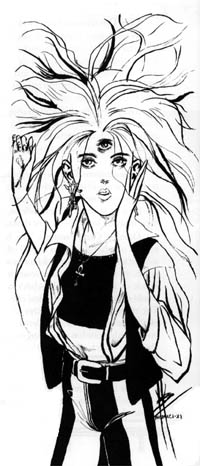
This widely hated bloodline has far more enemies than it really deserves. Only seven of
these Cainites exist at a time, for after a Salubri attains Golconda, she ends her
existence and passes her blood to the individual she has chosen to take her place. Almost
none survive for more than a few hundred years, for the Salubri consider vampiric
existence to be agony. These vampires can usually pass as humans until someone notices
that they possess a third eye.
Other clans perceive Salubri as murderers and diabolists of the worst kind. Princes
have been known to call a Blood Hunt at the merest suggestion that a Salubri might be in
their domains; the Tremere are especially known to hate them.
The reason for this animosity lies far back in the legends of the Salubri, once a small
clan of the same name. Saulot, the founder of this clan, is believed to be the first of
the Kindred to reach Golconda. It is considered fact that when he returned from his
journeys to Asia, a third eye had opened in his forehead, giving him access to new powers
no other Kindred had ever developed.
For the next several millennia, Saulot spread rumors of Golconda through Kindred
society. He is thought to have had a hand in the development of Carthage and the creation
of the Inconnu, though he never joined this august group.
During this time Saulot sired very few new Kindred, but those he did sire followed him
on his path to redemption. It is said he created his last vampire during the reign of
Caligula, and then removed himself from the company of both Kindred and kine. This
voluntary separation lasted until the Middle Ages, when an order of magi managed to find
Saulot Iying in torpor. The Salubri say the order's founder himself tracked down the
Antediluvian and sank his teeth into the Ancient's neck. The Salubri also claim their
founder did not resist. After this, the order methodically tracked down Salubri
descendants and slew them.
They did not slay them all, however. The older ones were actually the easiest to kill,
while the ones created after Saulot reached Golconda proved somehow resistant to the
order's magics. Thus the order did everything in its power to turn the world against the
Salubri, hunting them, terrorizing them, and leaving them unable to use their healing
powers without fear of being sought out and killed.
Despite this, the only force that manages to kill most Salubri is themselves. When a
Salubri sires, she takes great effort to teach her childe the ways of the lineage and how
best to protect himself. She also prepares the neonate's path to Golconda, and then
commits suicide by forcing the childe to drink her blood
Salubri believe the spirit of a vampire to be tortured, and to have no hope for peace
unless Golconda is attained. In fact, they think that anyone, Kindred or kine, who is
extinguished before reaching Golconda is eternally condemned to be a bound spirit (a ghost
that is restricted in location or temperament, and can be summoned and controlled by
mortals). The sole goal of the Salubri is to pass from this existence and thus be free.
Salubri consider it their duty to teach their beliefs to others, and take great efforts
to explain "the facts of things" to others. Because they cannot imagine wishing
to live an eternity of pain, they cannot imagine that other vampires would not like to
listen to their words. This is perhaps part of the reason why they are so widely disliked.
These Kindred find the path to Golconda easier than do most. hut even for them it is no
automatic thing. Salubri sires often hide clues in books, people and places for the
vampire to find. Once a Salubri has reached Golconda, he finds life easier in many ways.
Besides providing freedom from the Beast, Golconda lets Kindred open themselves to
Disciplines with ease. Instead of having to lower his generation to learn Disciplines
higher than five, a vampire in Golconda can learn new powers with but the expenditure of
experience. Thus Salubri ready to sire use the precognitive powers of Auspex to determine
their childer's fate and work to aid them along the path to Golconda. |



